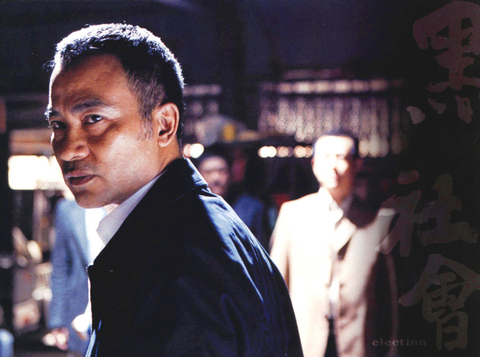On a recent weekend afternoon, a 22-year-old philosophy student considered the merits of Three Times (最好的時光), a bittersweet romance that heads the list of competitors at today's Golden Horse Awards.
"[It is] beautiful to look at and poetic, but too slow for most of my classmates," said Laura Wang, lamenting her contemporaries' growing preference for US-made romantic comedies and action thrillers.
Wang's observation reflects the fundamental dilemma facing Taiwan's film industry, which won world acclaim in the 1980s for its realistic portrayal of local life, but has since been undermined by fading viewer appeal and growing columns of red ink.

PHOTO: AFP
Over the past decade, annual movie production has stalled at around a dozen titles, and the box office market share for local films remains a minuscule 2 percent.
Producer Patrick Mao Huang (黃茂昌), a veteran observer of the local movie scene, says the dilemma comes down to either a gamble on the subtle arthouse movies that win awards at international festivals but frequently crash at the box office, or opting for the commercially surer, but less fulfilling, action and comedy fare that Hollywood and Hong Kong excel at.
He says that the huge success of Ang Lee's (李安) martial-arts epic Crouching Tiger, Hidden Dragon (臥虎藏龍) four years ago taught local industry leaders that what works best is a Hollywood or Hong Kong-style movie with a foreign cast that will widen its appeal beyond Taiwan's prohibitively tiny market of 23 million people.
"Taiwan is too small, so local movies need some international flavor," he said, noting that Crouching Tiger, Hidden Dragon featured actors from Hong Kong, China and the US, as well as Taiwan itself.
Film critic Carrie Tu agrees, but warns against taking internationalizing too far.
"We need excitement to bring the crowds back, but even commercial films need to keep an original viewpoint and a Taiwanese flavor," she said.
For youthful director Wu Mi-sen (吳米森), Huang's championing of the commercial approach makes a certain amount of sense, but only if arthouse films still survive.
Some people say "Taiwanese cinema is too personal, but many personal views can also lead to good movies," he said.
Taiwan's failure to sustain a lively movie industry has been cast into especially sharp relief by this year's Golden Horse Awards, which will bring ethnic Chinese stars from Hong Kong, China, Japan and the US under a single Taiwanese roof.
The event has been held since the 1960s, but the strongest contenders for major awards traditionally hail from Hong Kong, the nerve center of East Asia's entertainment world.
The top nominees this year are two Hong Kong action movies: Election (黑社會), which is up for 11 awards; and Kung Fu Hustle (功夫), nominated for 10 awards.
But in a potentially hopeful sign for the local industry, Three Times is also stealing the limelight, it is competing in nine categories, including best picture and best director.

Palauan President Surangel Whipps Jr arrived in Taiwan last night to kick off his first visit to the country since beginning his second term earlier this year. After arriving at Taoyuan International Airport at around 6:30 pm, Whipps and his delegation were welcomed by Minister of Foreign Affairs Lin Chia-lung (林佳龍). Speaking to gathered media, the Palauan leader said he was excited and honored to be back in Taiwan on his first state visit to Taiwan since he was sworn in this January. Among those traveling with Whipps is Minister of State Gustav N. Aitaro, Public Infrastructure

President William Lai (賴清德) yesterday thanked Palau for its continued support of Taiwan's international participation, as Taipei was once again excluded from the World Health Assembly (WHA) currently taking place in Switzerland. "Palau has never stopped voicing support for Taiwan" in the UN General Assembly, the WHO and other UN-affiliated agencies, Lai said during a bilateral meeting with visiting Palau President Surangel Whipps Jr. "We have been profoundly touched by these endorsements," Lai said, praising the Pacific island nation's firm support as "courageous." Lai's remarks came as Taiwan was excluded for the ninth consecutive year from the WHA, which is being held in

RESOLUTIONS DEBATE: Taiwan’s allies said that UN and WHA resolutions cited by China and other nations ‘do not determine Taiwan’s participation in WHO activities’ A proposal to invite Taiwan to this year’s World Health Assembly (WHA) was rejected on Monday, resulting in Taipei’s absence from the annual meeting for a ninth consecutive year, although partners spoke up for Taiwan’s participation at the first day of the meeting. The first agenda item after the opening was a “two-on-two debate” on a proposal to invite Taiwan to participate at the WHA as an observer. Similar to previous years, two countries made statements in favor of the proposal, while two others expressed their opposition. Philippine Secretary of Health Teodoro Herbosa, president of the 78th WHA, accepted the WHA General Committee’s

At least three people died and more than a dozen were injured yesterday afternoon when a vehicle struck a group of pedestrians in New Taipei City’s Sansia District (三峽). The incident happened at about 4pm when a car rammed into pedestrians at an intersection near Bei Da Elementary School. Witnesses said the sedan, being driven at a high speed, ran a red light, knocking scooters out of the way and hitting students crossing the road before careening into a median near the intersection of Guocheng and Guoguang streets. The incident resulted in three deaths and 13 injuries, including the driver, a 78-year-old man